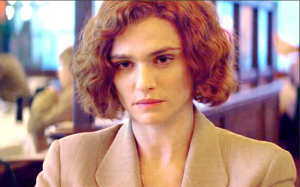Metro Canada: How the film Denial helped expose Holocaust deniers
 By Richard Crouse – Metro Canada
By Richard Crouse – Metro Canada
“I can’t understand why people don’t always say what they are thinking,” says Emory University professor Deborah E. Lipstadt. “I’m missing a certain filter. I say what I think.”
Lipstadt, a specialist in modern Jewish history, emerged into public life from academia as the subject of a 1996 lawsuit brought against her by self-taught British historian and Holocaust denier David Irving. Irving, upset she singled him out in a book as a less-than-reputable historian, launched a libel lawsuit claiming Lipstadt and her publisher were part of a worldwide conspiracy to rob him of his livelihood.
Donations from benefactors like Steven Spielberg paid for the gruelling eight-week, £3,000,000 trial which boiled down to one main question: Is Irving a liar and a falsifier of history or simply a historian who sees things from Hitler’s point of view? The stakes were high; if Irving won, his account of history would be given credence.
The sensational court case is chronicled in Denial, a new film starring Rachel Weisz as the outspoken academic.
“In the story of this trial and this case, a lot of very good people said to me, ‘Don’t do it,’” Lipstadt says. “A lot of people didn’t want me to do it because they thought I’d be giving him publicity. How do you fight bad people without building them up and giving them a billion dollars of free publicity?”
But the publicity helped expose Irving and other deniers, says Weisz.
“I think the more people who know that the better. Most people don’t know who David Irving is. He has his core group of followers and they’re going to be very happy about this publicity. Or not. I don’t know how they’re going to feel about this, but it is more important that people should know about it. And nobody does. It doesn’t really bother me that he’s getting publicity. It’s not good publicity.”
“I think Rachel is right,” says Lipstadt. “It’s a balance. I knew fighting him would give him publicity but it would serve a purpose.”
The British actress says capturing Lipstadt’s essence — from the heavy Queens accent to her personal boldness — was “a beautiful, delicious challenge.”
“Deborah came and hung out with me in New York,” says Weisz, “sat in my kitchen for two days straight. I filmed her on my iPhone so I would be able to look back at it. Deborah told me stories about her childhood, her parents and about the trial. It was just being able to be near her and soak up her spirit and attitude and find the places were we intersect as people. There are some (people) when you find that you think, ‘I could be this person if my life had gone differently.’ It became imaginable to me then that I could be Deborah had my life gone that way.”
Lipstadt describes watching Weisz’s performance as “an out-of-body experience,” adding that her friend, legal eagle Alan Dershowitz wrote her a note, saying, “She catches your accent but even more she captured your attitude.”
“It’s fun being you,” says Weisz. “I enjoyed it. You get to say what you think. I like it, it’s very healthy. Get it out.”
